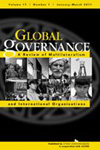Externe Publikationen

Minilateralism revisited: MIKTA as slender diplomacy in a multiplex world
Kim, Sung-Mi / Sebastian Haug / Susan Harris RimmerExterne Publikationen (2018)
in: Global Governance: A Review of Multilateralism and International Organizations 24 (4), 475 - 489
DOI: https://doi.org/10.1163/19426720-02404001
Based on over seventy interviews with diplomats and experts from all five MIKTA member countries, we find that MIKTA is used as a value-for-money minilateral mechanism for the world’s lesser powers grappling with the heightened global uncertainty and deepening interdependency. MIKTA foreign ministries have used the group as an ad hoc capacity-building and network-sharing scheme; and as a low-cost toolkit to diversify their traditional diplomatic channels and increase global visibility in various multilateral forums. However, MIKTA’s flexible, but precarious, institutional realities also suggest that minilateral arrangements that share MIKTA’s operational characteristics are likely to be short-lived and suffer from weak member commitment, resource constraints, forum-shopping risks, and a leadership vacuum.
The increasing prevalence of minilateral diplomacy in today’s global order can be a costly business for governments. Over the past decade, minilateral diplomatic mechanisms—arrangements including only a limited number of countries—have proliferated to handle emerging problems of deepening global interdependencies. New venues have been sought to solve old problems outside traditional multilateral avenues, which have become increasingly deadlock prone and anachronistic.1 This means that the number of international organizations, partnerships, and initiatives that diplomats can possibly attend has increased in tandem with the fragmentation and layering of global governance.
Few countries are adequately equipped to handle these challenges, as few have invested in the financial and human resources of their diplomatic apparatus sufficiently and in a timely manner.2 It is expensive to ensure effective strategic participation and visibility and to pursue normative leadership. Compared to global superpowers, many lesser powers are more likely to struggle to react and respond to—let alone shape—seismic changes in the multilateral sphere. Their foreign ministries tend to be overwhelmed by more immediate, high-stakes, high-politics challenges amidst rapid shifts in their traditional bilateral relationships and regional dynamics.
Kontakt
Cornelia Hornschild
Koordinatorin Publikationen
E-Mail Cornelia.Hornschild@idos-research.de
Telefon +49 (0)228 94927-135
Fax +49 (0)228 94927-130
Alexandra Fante
Bibliothekarin/Open Access-Koordinatorin
E-Mail Alexandra.Fante@idos-research.de
Telefon +49 (0)228 94927-321
Fax +49 (0)228 94927-130



